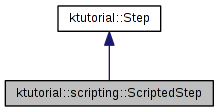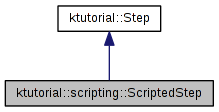Step to be used in scripts. More...
#include <ScriptedStep.h>


Signals | |
| void | setup (QObject *scriptedStep) |
| Emitted when this ScriptedStep has to be set up. | |
| void | tearDown (QObject *scriptedStep) |
| Emitted when this ScriptedStep has to be tear down. | |
Public Member Functions | |
| ScriptedStep (const QString &id) | |
| Creates a new ScriptedStep with the given identifier. | |
Protected Member Functions | |
| virtual void | setup () |
| Emits setup(scripting::ScriptedStep*) signal using this ScriptedStep as parameter. | |
| virtual void | tearDown () |
| Emits tearDown(scripting::ScriptedStep*) signal using this ScriptedStep as parameter. | |
| virtual void | connectWaitFor (WaitFor *waitFor, QObject *receiver, const QString &slot) |
| Connects the given WaitFor with the slot in the receiver. | |
| virtual void | disconnectWaitFor (WaitFor *waitFor) |
| Disconnects the given WaitFor. | |
Detailed Description
Step to be used in scripts.
It is just a special subclass of Step that makes possible to perform actions when the Step is activated or deactivated connecting to a signal instead of redefining C++ methods (as that can't be done in scripts). It also makes possible to execute functions in the script when a WaitFor waiting ends or an Option is selected.
If something must be performed when a Step is activated, implement a function in the script and connect it to setup(QObject*) signal. If something must be performed when a Step is deactivated, do the same with tearDown(QObject*) signal instead. Note that, although the argument in those signals is declared as QObject*, it is in fact the ScriptedStep that emitted the signals. It is a Kross limitation.
If a function of the script must be executed when an Option is selected or when the waiting of a WaitFor ends, just use addOption(Option*, QObject*, const QString&) or addWaitFor(WaitFor*, QObject*, const QString&) like you would do with a normal slot, but using "self" as the receiver and the function name (with or without parenthesis, at your option) as the slot.
Definition at line 55 of file ScriptedStep.h.
Constructor & Destructor Documentation
| ktutorial::scripting::ScriptedStep::ScriptedStep | ( | const QString & | id | ) | [explicit] |
Creates a new ScriptedStep with the given identifier.
- Parameters:
-
id The identifier of this Step.
Definition at line 29 of file ScriptedStep.cpp.
Member Function Documentation
| void ktutorial::scripting::ScriptedStep::connectWaitFor | ( | WaitFor * | waitFor, |
| QObject * | receiver, | ||
| const QString & | slot | ||
| ) | [protected, virtual] |
Connects the given WaitFor with the slot in the receiver.
If the receiver is a Kross::Action, the slot must be the name of a callable function (with or without parenthesis) instead of a true slot. When the WaitFor::waitEnded(WaitFor*) signal is emitted, the function will be called (thus behaving like a slot).
If the receiver is not a Kross::Action, the parent method is called.
- Parameters:
-
waitFor The WaitFor to connect. receiver The object to connect to. slot The slot to connect to.
Reimplemented from ktutorial::Step.
Definition at line 43 of file ScriptedStep.cpp.
| void ktutorial::scripting::ScriptedStep::disconnectWaitFor | ( | WaitFor * | waitFor | ) | [protected, virtual] |
Disconnects the given WaitFor.
If the WaitFor was connected to a Kross::Action function, the function will be "disconnected" from the WaitFor.
If the WaitFor was not connected to a Kross::Action function, the parent method is called.
- Parameters:
-
waitFor The WaitFor to disconnect.
Reimplemented from ktutorial::Step.
Definition at line 69 of file ScriptedStep.cpp.
| void ktutorial::scripting::ScriptedStep::setup | ( | QObject * | scriptedStep | ) | [signal] |
Emitted when this ScriptedStep has to be set up.
- Parameters:
-
scriptedStep A pointer to this ScriptedStep.
- See also:
- Step::setup()
- Todo:
- Change argument type to scripting::ScriptedStep* once all major Kross scripting backends support classes wrapped through WrapperInterface
| void ktutorial::scripting::ScriptedStep::tearDown | ( | QObject * | scriptedStep | ) | [signal] |
Emitted when this ScriptedStep has to be tear down.
- Parameters:
-
scriptedStep A pointer to this ScriptedStep.
- See also:
- Step::tearDown()
- Todo:
- Change argument type to scripting::ScriptedStep* once all major Kross scripting backends support classes wrapped through WrapperInterface
The documentation for this class was generated from the following files:
 1.8.0
1.8.0